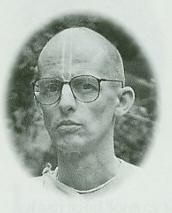
Satsvarupa Dasa Goswami
Sarvabhauma Bhattacarya had been a famous logician and teacher of the impersonal path, and his conversion to Vaisnavism is chronicled in several chapters of the Caitanya-caritamrta. It is said of Sarvabhauma after his conversion, "He did not know anything but the service of the Lord, and he always chanted the holy name of Sri Krsna Caitanya … . Indeed, chanting the holy names became his meditation."
Meditation is the seventh stage in the eightfold mystic yoga system by which one gradually learns to sit still, control the breath, withdraw the senses from the world, fix the mind on one point, and eventually attain full concentration on the object of meditation. Sarvabhauma Bhattacarya attained that stage by concentrating on the Lord's holy names.
In Western countries, "meditation" has become a buzzword. In the 1960s the only meditation that people discussed was "Transcendental Meditation," by which one could purchase a mantra and meditate on it twice a day. Now many other forms of meditation and "mindfulness" are popular both in Christian and non-Christian traditions. People meditate for a short time each day to relieve stress and augment health. Srila Prabhupada said that serious yoga practice aimed at a spiritual goal is far too difficult in this age of distraction. Real meditation is full time.
For those who chant the holy names, hearing japa (private chanting on beads) described as "meditation" may sound distasteful when considered alongside the other processes practiced these days, butjapa is meditation, and to achieve the result we must do it with attention.
Meditation involves controlling the mind, and that's difficult, as anyone who has tried to chant realizes quickly. Therefore, we sometimes wonder whether it is necessary or helpful to study meditation techniques and bring them into our own practice.
Srila Prabhupada didn't think so. Whenever devotees asked him how to concentrate on the holy name, he responded simply: "Just hear."
"But what about my mind?"
"Just hear."
Prabhupada knew that by chanting we would learn how to chant; the holy name itself would teach us. The Bhagavad-gita assigns the path: "From wherever the mind wanders due to its flickering and unsteady nature, one must certainly withdraw it and bring it back under the control of the self."
Therefore, in the name of disinterest in other forms of meditation, we shouldn't abandon the practices common to all forms. We should begin our daily japa by calming the mind. We should chant our rounds (of beads) in a sacred space and control the breath by the chanting. We should fix the mind on the syllables of the holy name. We should maintain good posture. In the early days at 26 Second Avenue in New York City, we would sit slouched over as Srila Prabhupada gave his morning class. Once he stopped his lecture and asked us to sit straight. Although bhakti-yoga does not involve sitting postures and breathing exercises, he said, it is still yoga.
With the aid of these basic components of meditation, we can learn to become prayerful in our approach to the holy name. Sarvabhauma Bhattacarya was able to chant with no other thought than the name and Lord Caitanya's mercy.
Our biggest obstacles to chanting are indifference to the holy name and distraction. Bhaktivinoda Thakura addresses these points in his Harinama Cintamani, suggesting that we chant in the company of devotees focused on the holy name. By learning to emulate their mood, we will learn to concentrate. He also suggests we chant in a secluded place. By accepting the discipline of a vow to chant, we will be forced to fix our attention. Gradually we will move from an hour spent chanting to two hours to four hours, and eventually we will chant constantly.
And enthusiasm is vital. Bhaktivinoda Thakura states: "Those who chant distractedly are always eager to somehow complete the fixed number of holy names and be done with it. It is important to concentrate on the quality of the chanting and not on trying to artificially increase the number of holy names."
He adds that we should utter and hear the name distinctly. It is only by the Lord's mercy that distraction can be overcome. "Therefore it is essential to fervently beg for the Lord's grace with great humility. This is the living entity's only means of salvation."
Ultimately, our success in chanting will come from Krsna's mercy, but while awaiting that mercy, we can continue to chant with enthusiasm and concentration and, as far as we are able, make the holy name the central focus of our lives.
Satsvarupa Dasa Goswami travels extensively to speak and write about Krsna consciousness. He is the author of many books, including a six-volume biography of Srila Prabhupada.
